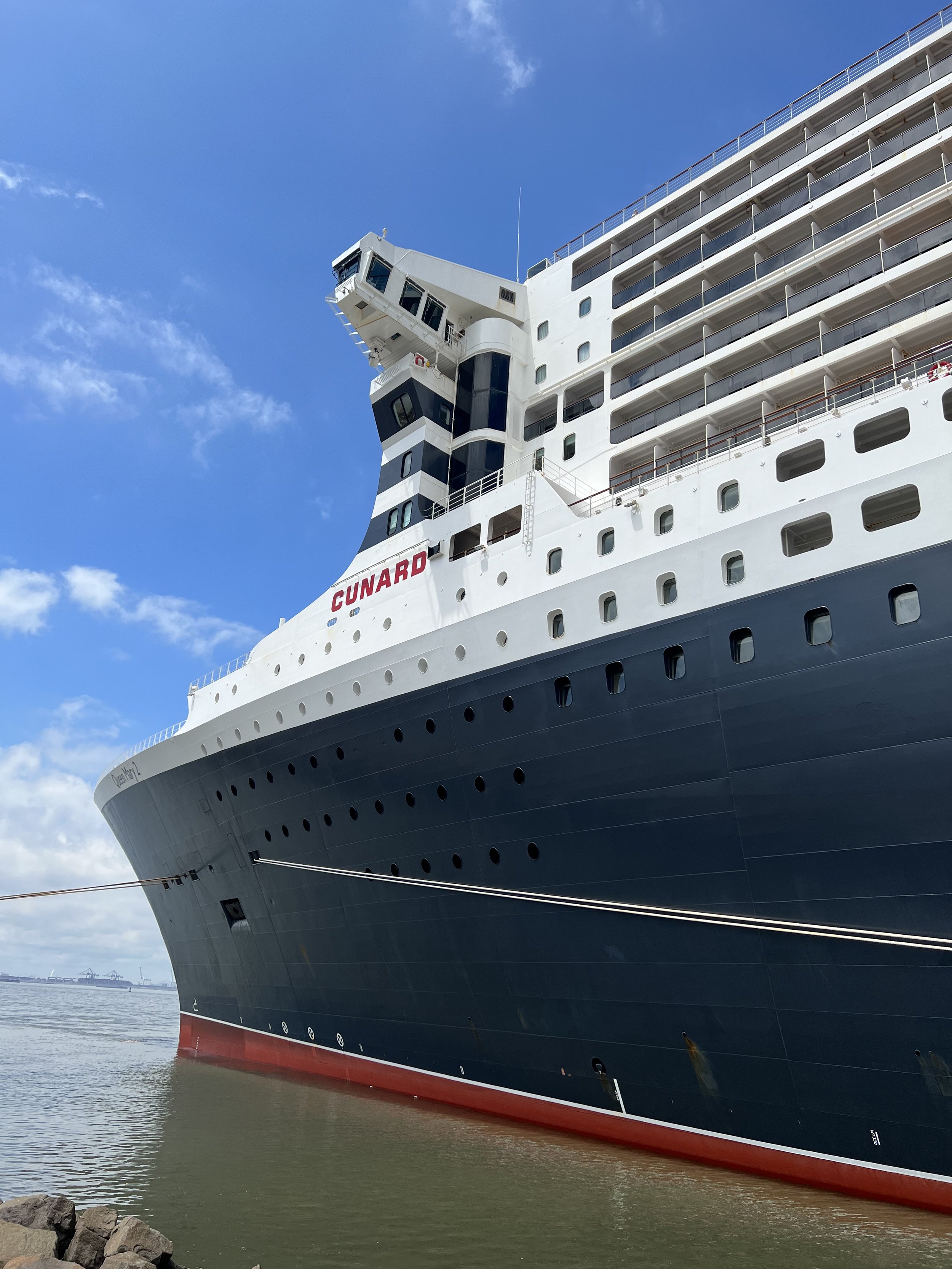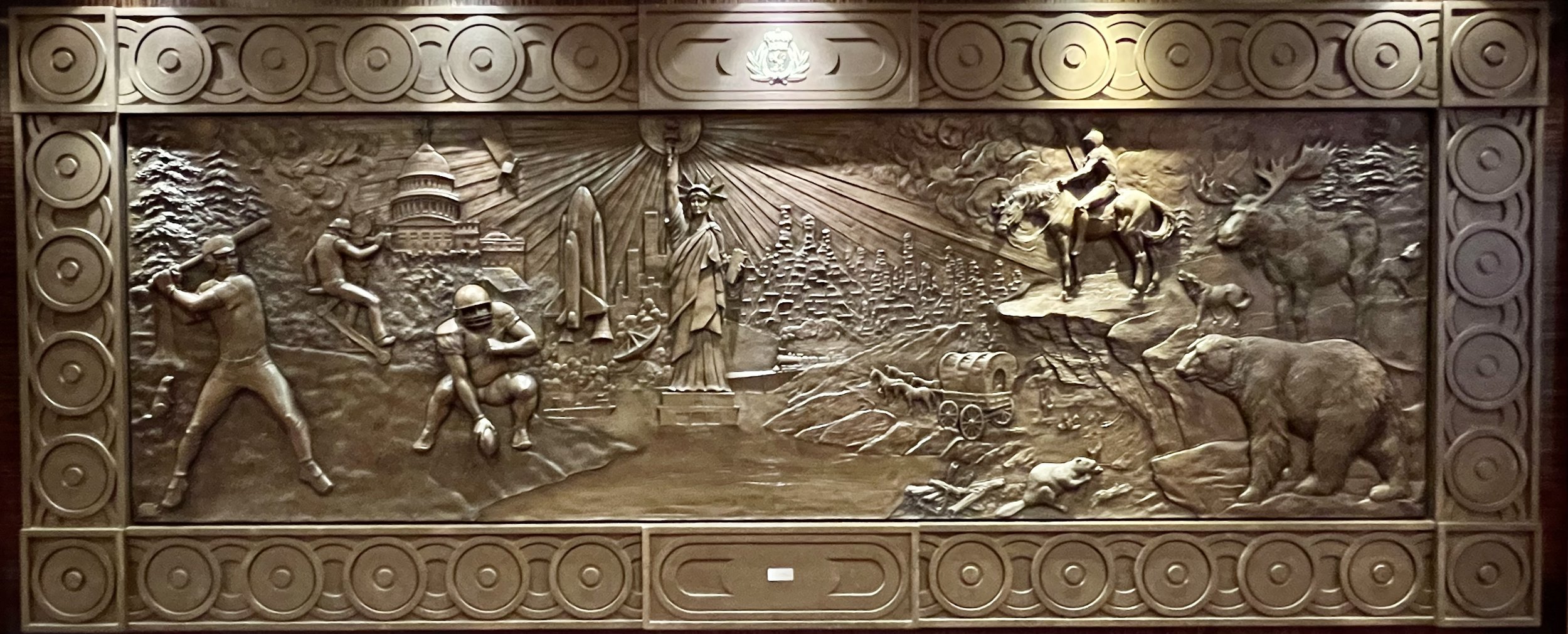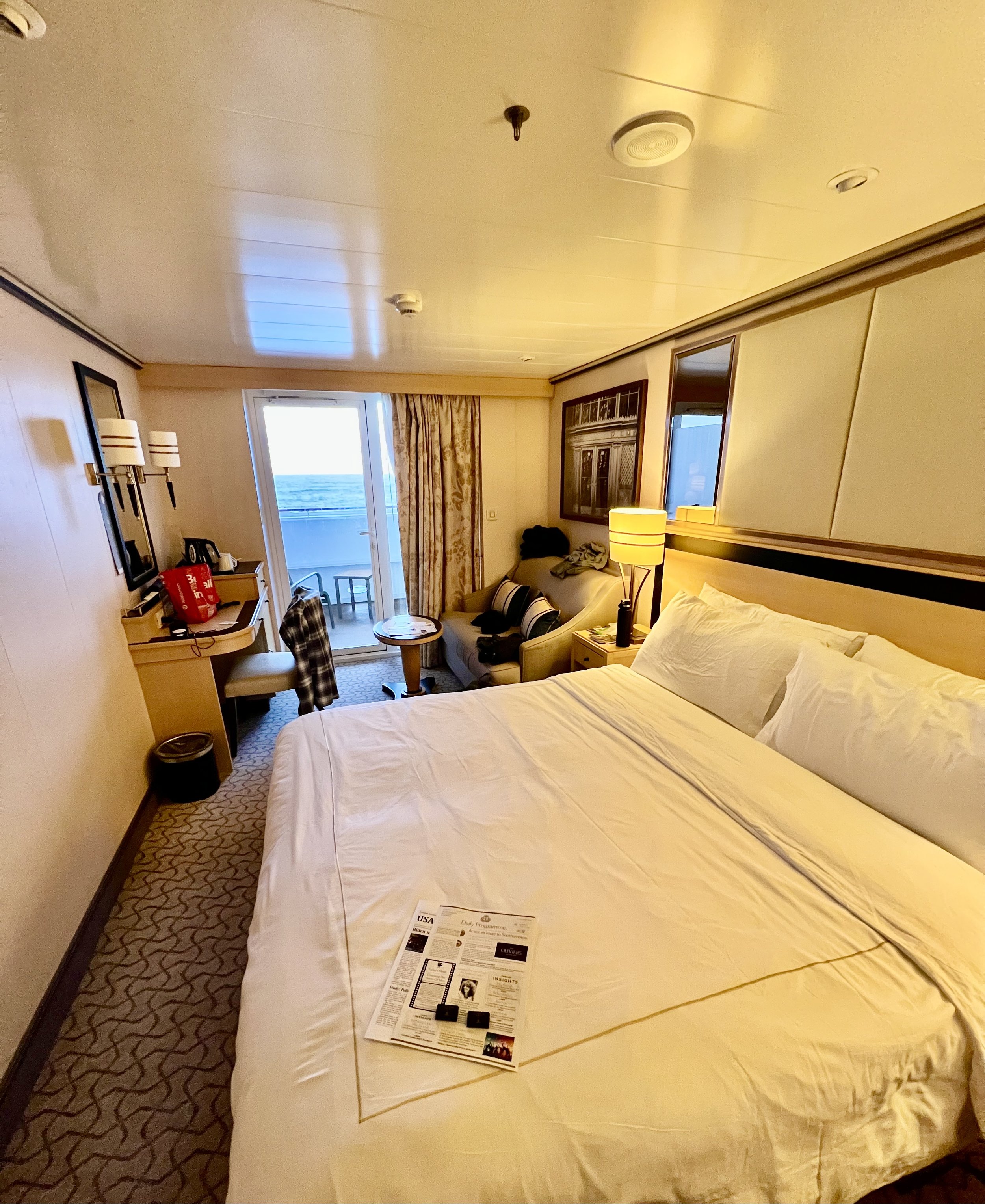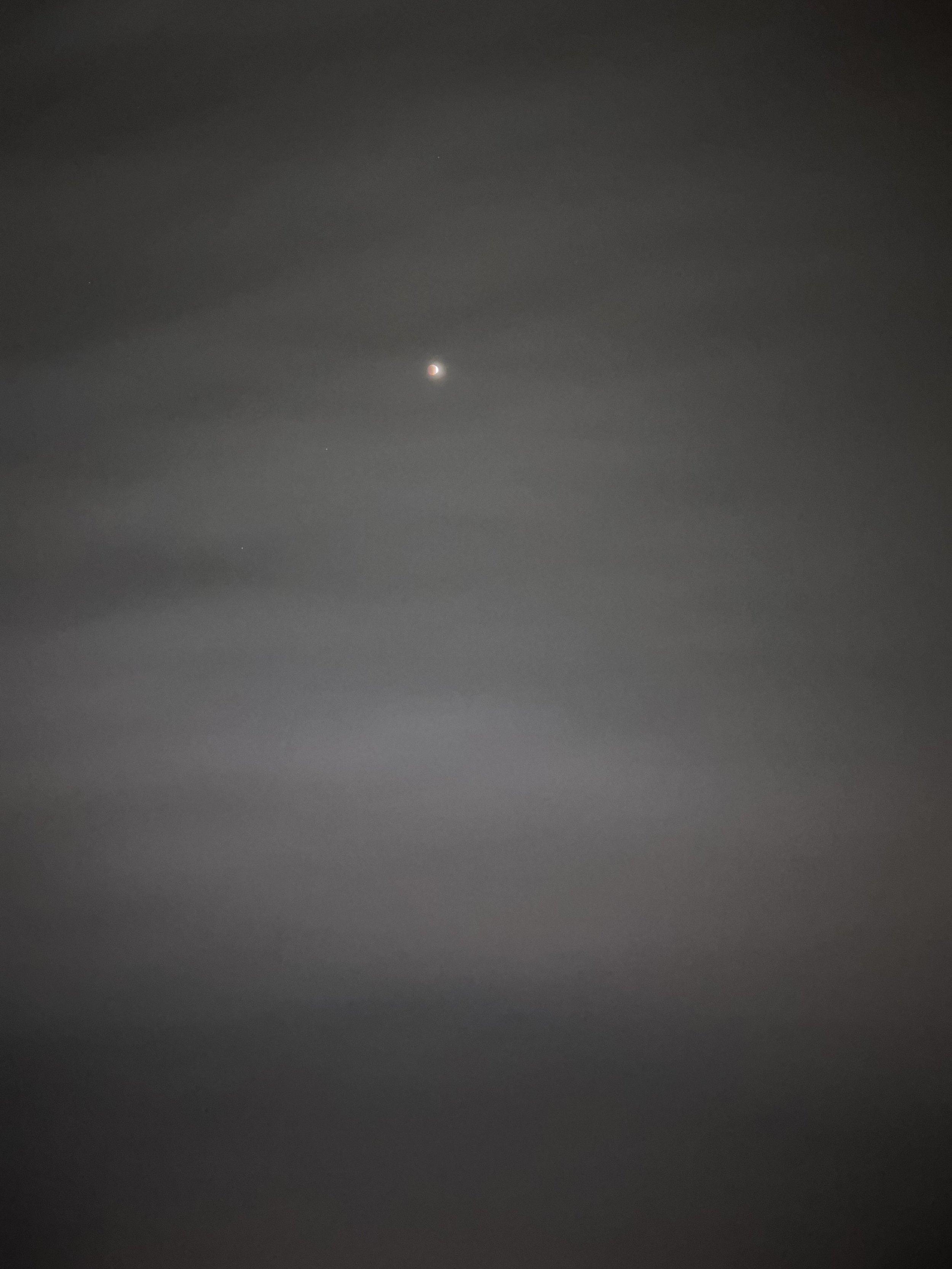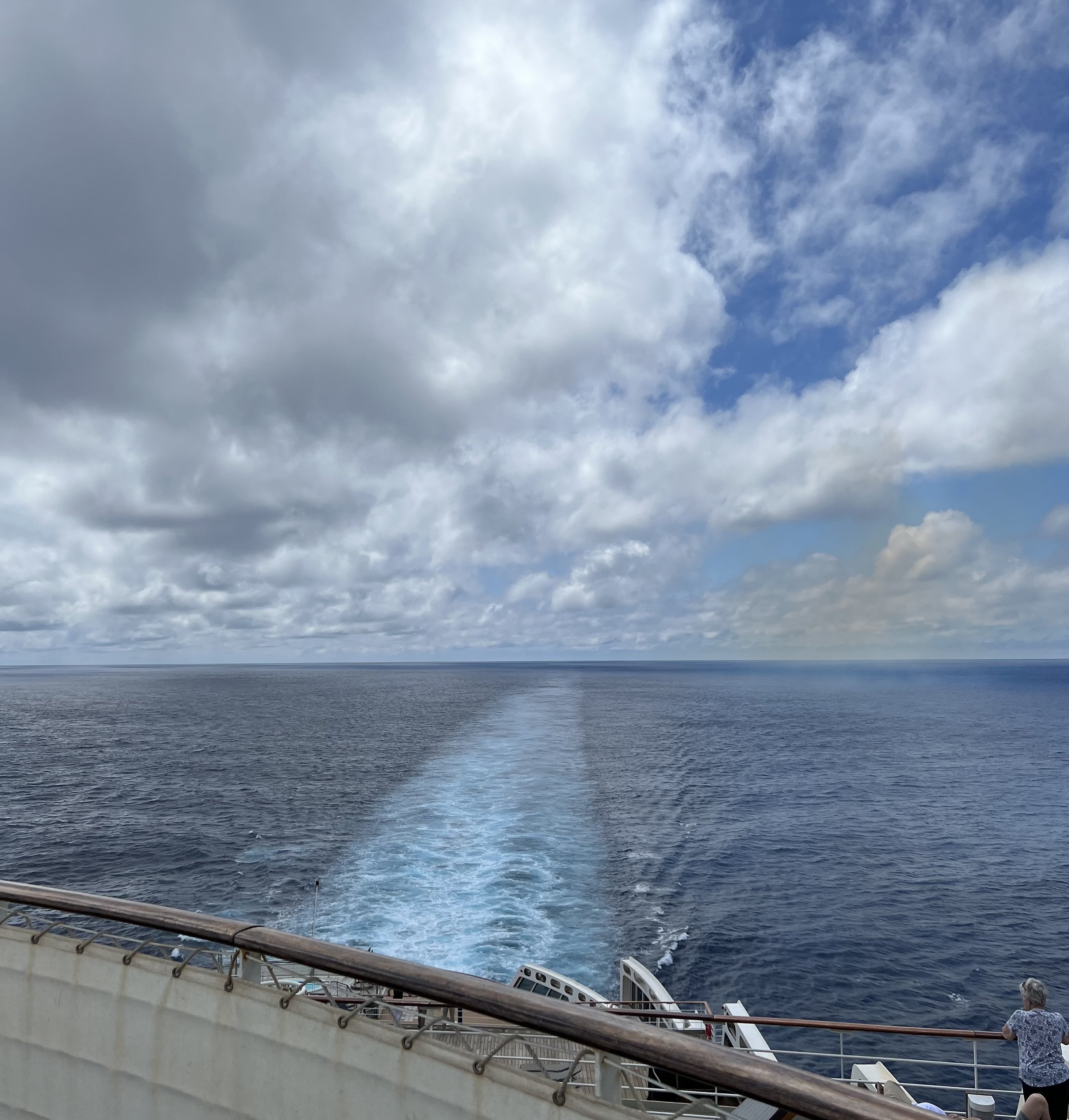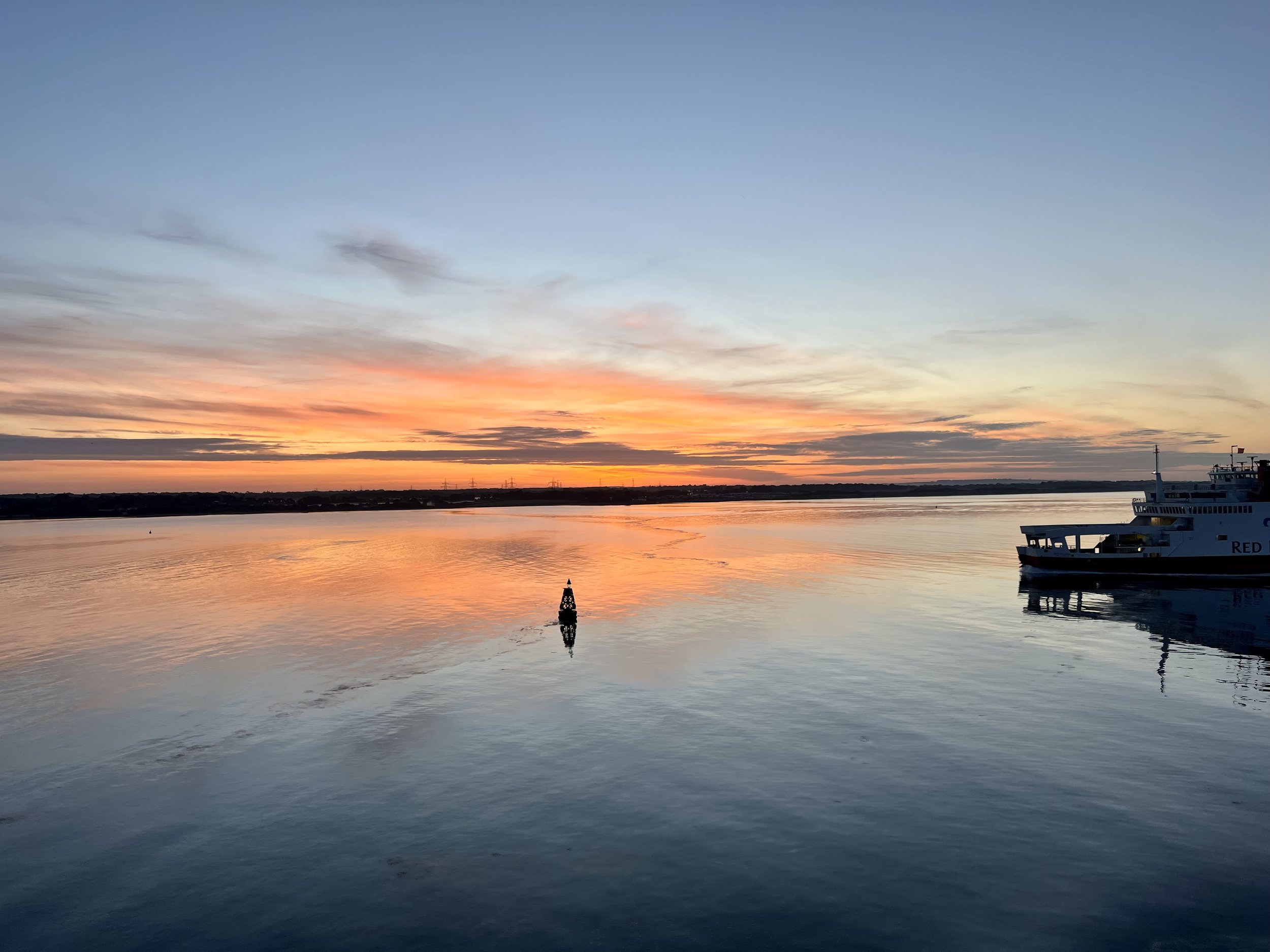Sailing the Queen Mary II
Dispatch XXVII
A Vagabond’s Adventure. Continent # 2: Europe
Arriving in Brooklyn
Brooklyn New York, May 14 – day 200 - foggy 57°
From Salt Lake City we left the Wasatch Mountains behind by way of Amtrak’s Zephyr, boarded the Capitol Limited in Chicago to Pittsburgh and then took the Pennsylvanian to New York where we planned to sail across the Atlantic on Cunard’s Queen Mary II, a total of more than 5,000 non-flying miles. If all went according to plan, we would arrive, at last, at a continent other than North America. We passed a couple of nights in Manhattan for meetings, and then arranged a hotel near the Brooklyn docks, the better to ensure we didn’t miss the boat, literally, amidst the snarls of New York’s traffic. Our Lyft driver, a young Chinese man named Tao who spoke mostly Chinese but understood English, navigated us along the Hudson River Parkway, under the East River and directly to the Liberty View Hotel on Fourth Avenue. $50 plus tip. Aaah, New York.
It was drizzling when reached the hotel, a slim, new building, not overly large. Our room was pristine, snug but more than serviceable; close to the docks but not so close, at least in the drizzle, to truly provide the view of the Statue of Liberty the hotel seemed to promise. It sat amidst a classic Brooklyn neighborhood surrounded by local retailers, manufacturing shops, and working class restaurants. Cyclists and scooters streamed along the borough’s bike routes. Unlike Manhattan there was an air of blue collar practicality, rather than the whiff of tourism and money.
A view of Manhattan through the mists of Brooklyn. Cyclists stream along the blue collar bike lanes of the neighborhood.
In search of lunch we stumbled into El Tenampa, a Latin restaurant right along the sidewalk, not far from the hotel. To get at a meal, you first passed through a bodega corridored with standard snacks, drinks, simple groceries, and then into the restaurant itself which consisted of a few tables and a counter where all hell was breaking loose.
Behind the counter, two dark-haired women scurried back and forth, barking orders in Spanglish to two short order cooks who were furiously generating tacos, fajitas, burritos, sopas, and flautas in the tiny kitchen behind them. The room was filled with diners. We added to the line. A big sign: read CHIPS and another BREAD: ORDER AQUI and next to that: PICK UP.
Excepting me and Cyn, ‘nary a soul spoke English. Had we walked back into a Baja time warp? I waited in line and eventually made it to the counter where one of the dark-haired women stood awaiting my order. She explained the menu in Spanglish so rapid I found myself standing dumbly before her pretending comprehension when I truly didn't understand a word. Finally I did get out, “Fajitas de Pollo, por favor.”
She looked at me suspiciously. "Fajitas de Pollo?”
I repeat it, without much confidence.
“How many?”
I hold up two fingers.
She seems disappointed but scribbles down some hieroglyphics on a white pad she whipped out of her apron, turned to shout orders to the cooks and disappeared like a sprite. No payment was asked for so I returned with Cyn to our little Formica table and waited along with a squad of workers who were standing and sitting among us — mostly manual laborers, and a family with two young children who squealed at goofy jokes their father was making with them.
The food took some time, but eventually a young man appeared and handed us the fajitas on a platter with a big smile and then added a single chicken taco, apparently part of the order I had unknowingly agreed to. All the food was prepared from scratch, and it was excellent with a fine salsa rojo that made your tongue sing.
May 15th — day 201 – foggy 63°
At 12:30 PM our Lyft driver zipped us to Brooklyn’s Cruise Terminal - Pier 12 where, with luck, we would soon find ourselves in stateroom 5029 on deck 4 of the great ship. At least that’s what the Cunard paperwork indicated. But there were problems. Along side the Queen an ominously long line had formed and it didn’t seem to be moving. “Computer issues” was the word we got as we joined the line.
The Queen Mary II and the long lines waiting to get onboard.
A half hour passed beneath a hot sun and rising humidity and finally the long string of increasingly cranky passengers began to move. Then, another snag. Cyn and I are informed that a Covid test that we had somehow failed to take would be necessary. This was news to us. Cyndy never missed details like this, but if we didn’t take the test, there would be no Atlantic voyage. So we got jabbed, as the Brits liked to say, right there in a gargantuan warehouse, and awaited the results with a handful of other losers. Finally, (it’s now 2 pm) we receive word that we are Covid free, don our masks and, at last, pass onto the QMII herself.
Before the ship weighed anchor, I took a stroll through the ship’s corridors and decks. The Cunard Line is famous, and there’s good reason for it. It was founded in 1839 and awarded the first British transatlantic mail contract. The line specialized in steam powered paddle wheelers which were much faster and more predictable than the schooners of that era. For the better part of the 19th century Cunard’s ships were the fastest on the Atlantic, and they used their expertise to expand into moving passengers as well as mail between the United States and Europe.
I read one of the placards where a riveter described the building of the immense ships in their 1930s heyday. “Men would be riveting 80 to 100 feet up, sometimes higher … swinging hammers - on two wooden planks, sometimes only one, without any guard rail. The plank would be bouncing as they worked. We'd have been safer trying to work on a tightrope.”
The last time I checked, the predecessor of the ship we had boarded, the original Queen Mary, was now a hotel docked in Long Beach, CA. She was the flagship of the famous line, but today’s QM is no slouch either. She, too, recalls an age of pre-war elegance. It is not as big, but human size sculptures of Zeus and whole walls of images detailing ancient civilizations, flora and fauna are etched in the main hallways, an echo of the Art Deco style. Paintings, mostly in the style of French impressionists, grace the ship’s staircases. On deck 2 you can walk its length and explore the entire history of the Cunard line with photos, art and passages that illustrate everything from the way the ships were built to the rich and famous who regularly used these ships in style before they were nearly put out of business by the likes of Pan American Airlines, TWA and British Airways.
Wall sized artwork along the Queen Mary II’s main corridor that reveal history and locations around the world.
An Art Deco touch.
I’ll take a ship any day of the week over airline flights these days, especially one that evokes the refinement and comfort of another age like this one; a time when relaxation was part of the journey, and you could enjoy the immensity and beauty of the sea, rather than tapping your feet in frustration at airport security or glaring at your phone waiting to deal with the next problem to bling out from the world’s ubiquitous cell phones.
But the 21st century has long ago left those pre-war days behind; nevertheless, the passengers we meet were often well traveled, and as I walked the deck that first day, I heard snippets of conversations about living on "both sides of the pond;" excursions to Zambia, the Himalayas and Denali. Serious, deep travelers.
At 3 pm the ship’s great engines thundered to life and the Queen turned out to sea. The departure was everything I hoped it would be. We swept by the Statue of Liberty in stately fashion and though I wouldn’t have thought it, I felt a lump rise in my throat as I thought of the words at its base:
"…
'Keep, ancient lands, your storied pomp!' cries she
With silent lips. 'Give me your tired, your poor,
Your huddled masses yearning to breathe free,
The wretched refuse of your teeming shore,
Send these, the homeless, tempest-tost to me,
I lift my lamp beside the golden door!'"
We leave the State of Liberty behind … and the skyline of Manhattan. Quite a view.
Beyond Liberty Island we turned into the Verrazano Straits, passed Long Island and made our way east until by morning we were heading north toward Nantucket and eventually our old friend the shores of Newfoundland and its Grand Banks. Cyn enjoyed the view and I enjoyed her enjoying it.
Cyndy views the view.
Once settled in our stateroom, we ordered room service and watched nightfall. The Queen Mary's accommodations are impressive. We managed to suffer through a king size bed with a couch and cozy desk and an outside deck that showed off the sea. Full bath, of course, and an excellent shower. We sat outside after dinner, and watched the sun set. I could hear the crash of the sea as the ship plowed forward obliterating its 10 foot swells.
Stateroom 5029. Very comfortable accommodations and amenities.
A full moon arose and spread a silver disc of light across the water. The fog rolled in and sat upon the sea like a great cat, and far away I heard the growl of the fog horns along Nantucket sound. It made you wonder if some monstrous, Kraken-like creature might emerge at any moment from the sea.
The first night on the ship, a full moon and a full eclipse of it. It was as if I was witnessing something that predated the human race, maybe even life itself.
I had forgotten that the physics of the solar system had arranged for a full lunar eclipse this very night. It was late. Cyn had fallen asleep, but I crept out to watch the immense, white sphere losing itself in Earth’s shadow. Awesome is an overused word, but here it did the experience justice. Watching this great bright rock disappear as it hung over that endless and endlessly deep sea was overwhelming. The feeling was primal, and I felt completely disconnected from the high technological world that we live in. I felt as though I was witnessing something that predated the human race, maybe even life itself. And I struggled to capture the words to describe it, even to myself.
By 11:30 PM all but a sliver of the moon had disappeared.
I wondered what ancient cultures must have thought when they witnessed something like this? What forces had the power to take away the moon? How strange and awful. It was amazing events like this that led our ancestors to develop myth and religion, and eventually science. How else could you explain thunder, lightning, storms, the rising of the sun, the passage of seasons, all of them beyond our control?
May 16 - At sea - Day 3 of the Voyage, Day 202 of the Adventure - Our wedding anniversary.
Foggy. 59º. On this day in history the first Academy Awards were presented. Wings won "best production," while Emil Jannings and Janet Gaynor were named best actor and best actress. In 1960 the first working laser was demonstrated at Hughes Research Laboratories in Malibu, California. In 1975, Japanese climber Junko Tabei became the first woman to reach the summit of Mount Everest. And in 2009 Cyndy Mosites and Chip Walter were married in a ceremony together with their four children and three parents.
We celebrated the morning by steaming toward Newfoundland’s Grand Banks. The captain explained we were taking the curved route across the pond because in a spherical world that gets you from point A to point B quickest. Tell the Flat Earth Society that! I thought. (See Dispatch X - “Trekking One Corner of the Flat Earth.”)
The Queen Mary II Steams To Britain
Any indications of land have now been obliterated by the Atlantic. The sea looks clean and untouched. I can’t see the tons of garbage that circle in the Sargasso Sea or the trillions of micro plastics we have somehow sent to the oceans. It's easy to imagine what the Atlantic might have looked like during the time when whales ruled the North Sea.
Evening – We dined at the Queen Mary’s full restaurant rather than its expansive cafeteria and enjoyed Hake and Steak, two glasses of a nice Pinot and Chardonnay and dessert — chocolate mousse prepared onboard. No meals, I am told, are pre-cooked on the QM2.
Meanwhile, the ship was making her way toward Newfoundland as the sun grew low. By the time we returned to our stateroom, the ship had steamed into heavy fog and we watched it obliterate the sea.
The Queen Mary II makes you to feel buoyant, which is a good thing when you’re on a ship. Everything is made easy: Food is everywhere and in every imaginable variety from Chinese stir fry to Scottish scones, and it's all well done. You can eat food that is really good for you or gobble down massive amounts of calories that'll clog your arteries and lay on the fat quicker than Jack Sprat’s wife: Smoked salmon, sushi, pies, curried chicken, roasted raw vegetables, ice cream, steak, lamb, french fries, baked potatoes, boiled potatoes, potatoes that have been mashed. Fruits from around the world — guava to kiwi, grapes to grapefruit, melon that is red, orange and green; desserts of mousse, scones, biscuits, cake, Jell-O, pudding and custard.
None of this includes the sit-down dining room fare provided each evening, with occasional black tie and formal evening affairs for those who prefer it (we did not have the room for such a wardrobe).
At day’s end, we turned out the lights, and lay in bed listening to the ship’s creaking as its bow broke the swells and crashed in a rush of foam along the steel that held us together. We hear the full-throated blast of the ship’s foghorn gain and then, in time, fell asleep, rocking and holding one another, and remembering that day when we became full partners.
May 17, 2022 - At sea – Day 4 of the Transatlantic Voyage, Day 203 of the Adventure
Foggy, cool with gusty winds and rough seas. Nothing that would set the chinaware flying, but you definitely know you're at sea. Hardly anyone is outside on deck. It’s too cold and rough, but I decided to take a stroll and shared it with this video.
We are now as far North as Central Nova Scotia, a few hundred miles west of where Titanic went down, and by afternoon we will pass abeam of the wreckage. Just north of us are The Grand Banks which means we are entering a part of the Atlantic known for both its abundance of marine life as well as its infamous fog patches.
May 18, 2022 – At sea - Day 5 of the Transatlantic Voyage, Day 204 of the Adventure
Bright and sunny May 18th. 41° We awaken, and lay lazy, eyes closed, feeling the sea’s gentle hand and far away can hear the thrumming engines moving us toward England. We’ll lose another hour of daylight today as we head into the rising sun. Nearly every day around noon one more hour disappears. The wind and fog have dissipated but the swells remain. We have sailed beyond the eastern foot of Newfoundland. Only a few months earlier we had walked that island’s rocky shores and stood atits northern tip, the very place Lief Ericsson had landed 1000 years earlier.
The size and complexity of a ship like this bends the mind. It has nothing like the gargantuan dimensions of a cargo ship or the monstrous 15 deck Carnival or Disney cruisers. Nevertheless, at 1100 feet long, it is big enough to comfortably care for more than 2500 passengers and 1200 crew. There are the guts of the thing – the engines that drives propellers several stories high, the wiring and electricity needed to power all 11 passenger decks, 6 restaurants, 14 lounges, 8 boutiques, 8 outdoor Jacuzzis and 20 elevators. This doesn’t include the boat’s offices, laundromats, kitchens, libraries, stores and small casino.
On this voyage Cunard had brought Olivier award winners on board. The Olivier Awards, named for Britain’s great actor Lawrence Olivier, are Britain’s version of Broadway’s Tony’s; high class talent. We were treated to a first rate production of Kinky Boots with the Olivier awardee Matt Henry playing the lead role. When I mentioned to him that Pittsburgher Billy Porter had originated the role on Broadway, he was gracious and kind, saying that was a high bar to hit. The theme for the week was Great West End London Shows. We watched several fine shows and while I scribbled away at a desk somewhere on the Queen Mary, Cyn would watch presentations about the inside story behind award winning set designs, directing or choreography. It was an example of Cunard’s level of quality at a price that rivaled the cost of flying by jet.
Nothing on the ship is put together like your normal landlubber building. Here door hinges are reinforced to ensure sudden lurches don’t snap them clean. Windows are thick and bolted in place to keep the water out. Every seal is tight. Dimensions are scaled down a smidge to save space. Efficiency of design is paramount, yet in some places – like the grand staircase or the beautiful artwork in the corridors or the comfort of the theater — the ship’s architects make a statement now and again. Attention to detail is de riguer and not a niche is dusty or dirty. Everywhere I saw staff cleaning, organizing, painting, polishing, scraping, scrubbing.
Some additional examples of the Art and Architecture of Cunard’s Queen Mary II
May 19, 2022 – At sea - Day 6 of the Transatlantic Voyage, Day 205 of the Adventure
55° moderately rough seas, but the Queen Mary Two simply rolls over them toward the Azores. On this day in history, Anne Boleyn, the second wife of England's King Henry VIII, was beheaded after being convicted of adultery In 1536. (The King, of course, never did such a thing.) Jacqueline Cochran, 47, became the first woman to break the sound barrier flying a Canadair F-86 Sabre and 1973, and U.S. Attorney General Elliot Richardson appointed Harvard law professor Archibald Cox Watergate special prosecutor.
We will cross over the Mid-Atlantic ridge, a scarred feature of earth miles below the Atlantic that is roughly 10,000 miles long and 1,000 miles wide. It runs equidistant between Europe and North America because it acts as a kind of conveyor belt that expands land from the Earth’s mantle, growing the Atlantic Ocean basin about 2.5 centimeters (a couple of inches) east and west. Iceland exists because it has bubbled up from this ridge to create the island. We are now 1406 miles into the trip.
It’s difficult to imagine how the Atlantic, or any other ocean for that matter, somehow stays put when the planet it sits upon is spinning at 1000 miles an hour. I know it's because we are revolving around the sun the way a bucket of water revolves around your head when you swing it, but it still requires more than my meager mind is capable of comprehending.
Later in the day, when the sea had calmed, I stood aft of the ship and watched the Atlantic march past like an endless army of watery peaks. The sun was dropping low on the horizon and its light caught their edges and turned them into a molten river. Soon the sun would disppear and the Atlantic, like the rest of the planet, would roll away and grow dark. For some reason, poems about the sea came to mind… Coleridge’s
“Water, water, everywhere,
And all the boards did shrink;
Water, water, everywhere,
Nor any drop to drink …”
And Masefield’s …
“I must go down to the seas again, to the lonely sea and the sky,
And all I ask is a tall ship and a star to steer her by …”
Not that I was any great sailor. I was a landlubber who wished he was a sailor, and I hoped on this Vagabond-Adventure to ride some waves before it was all done. After all, there were seven seas and this was only one of them. Later, we would meet many true sailors, people who had nearly died more than once captaining ships, and seen things only sailors see. But they come later.
May 20, 2022 - At Sea - Day 5 on the Transatlantic Voyage - Day 206 of our Vagabond-Adventure
The swells continue to stride across the Atlantic. We’ve covered over two thirds of the ocean and right now the Queen Mary II is traveling above H2O that is two miles deep.
Most of the people on the Queen Mary are not of the spring chicken variety. I estimate 90% of the people on the ship are over 65 and a good many older than that. Still you'll see them on the deck, doggedly circling it, getting in their constitutionals, or hauling against gravity in the gym.
When I strolled the ship and watched people buried in a book or laughing with their spouse over breakfast, I wondered about the lives they’ve lived, what traumas or joys had they experienced as they brought children into the world, how they raised them, and suffered and laughed when they did. Some may have lost their children, or separated from a spouse or two before they ended up with this one. For every human being, there’s an interesting story, if you look closely enough.
Coming into the great port of South Hampton
May 21-22, 2022 - At Sea - Days 6- 7 on the Transatlantic Voyage - Day 207-208 of our Vagabond-Adventure
We began our 6th day with blustery winds, but by late afternoon the weather turned perfect as we swept by the Celtic Sea, swung around the Isle of Wright and into the mouth of English Channel. The morning of the seventh day, I arose at sunset and caught a glimpse of our ship gliding to its South Hampton docks against a silent, rose sky. It was dead quiet and I could hear the steady creaking of the ship until we came closer to South Hampton, its immense port and gargantuan cargo ships.
Disney, the Internet and media in general have drilled into us that it's a small, small world, but it isn’t. It it takes time to get from place to place unless you happen to be traveling in jets at 500 mph, eight miles above the planet. That saves time, I can’t argue that, but so much is lost in the bargain. For us, slow travel was best so that we could take in the vastness of the place that the human race has settled and see all of its delicious and stunning variety at ground (and sea) level. It seemed to me that made the old saying: “it's about the journey not the destination,” truer than ever.
But even when traveling slow, the next destination always beckons. It was time to go. We enjoyed one last breakfast, said good-bye to our fellow travelers and packed up our bags, grateful for the six days we didn’t have to unpack a single bag. And then we walked off the gangplank to board our bus for London. We would take in a full day there, and then spend four more traveling under the Chunnel to Paris then to Madrid and onto Tarifa on four trains, one bus, and finally a ferry across the Straits of Gibraltar to the mysterious city of Tangier, Morocco.
Next up: A series of Dispatches on Morocco starting with the Mysteries of Morocco.
In the meantime, crack on!
Your Vagabonds,
C-Squared
This is a series about a Vagabond’s Adventures - journalist and National Geographic Explorer Chip Walter and his wife Cyndy’s effort to capture their experience exploring all seven continents, all seven seas and 100+ countries, never traveling by jet.
As of this Dispatch …
We have so far travelled 9,100 miles, across six ferries, one transatlantic ship, on eleven trains, visiting five World Heritage Sites, through 26 states, 15 National Parks and monuments and seven countries, in 69 different beds, and run through more keys than a grand piano.
For a deeper dive into our adventures (and misadventures), read Dispatches like this one … and don’t forget to check the Daily Journal for summaries and recommendations of our journey as we move day-by-day through the planet.
Recommendations
If you’re heading to overseas or you’re shopping for ideas for your next excursion, we wanted to share our recommendations. Feel free to leave your own suggestions too in the comments below! We want the thousands of other vagabonds who have joined us to know about the places you’ve explored and about your own experiences on the high seas, in Europe (or anywhere in the world, for that matter). Here you go …
The Queen Mary II - Naturally! We relish rapid travel, but in an era of eco-consciousness and expensive airfares, it’s good to take a look at alternative locomotion when time allows. Read more about the Queen Mary on our Recommendations page if you’re considering a booking.
El Tenampa, Latin lunching. A deli in the back of a grocery. Delicious and bustling, even if the service wasn’t as rapid as you might expect for New York City. New York Magazine also had some nice things to say.




